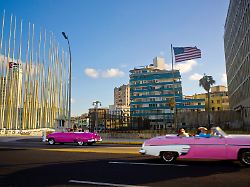Cuba under US sanctions
“Entrepreneurs must return with suitcases of money”
By Andrea Sellmann and Mary Abdelaziz-Ditzow
3/17/2023 8:54 am
Cuba is in a severe economic crisis. To mitigate the consequences, a whiff of privatization has recently been blowing through the Cuban planned economy. There are also fewer taboos when it comes to working with the state. German companies sense opportunities, despite the US embargo.
In Havana it seems as if time has stood still: Buicks, Chevrolets and Cadillacs are part of the cityscape. The cars date from the 1940s and 1950s, when the USA and Cuba still traded actively. Today, the vintage cars are silent witnesses to the US trade embargo that has economically isolated Cuba for six decades. After a temporary easing, US President Donald Trump tightened the sanctions again towards the end of his term. German companies that have discovered the Cuban market are also feeling the effects. The main problem is the financing of joint economic projects.
Towards the end of his US presidency, Donald Trump not only reversed the easing of sanctions, but also put Cuba back on the US list of states that support terrorism. Cuba itself vehemently denies this. And many observers see this step primarily as a political move by Trump, who has created economic facts beyond his term of office. Hardly anyone expects the USA and Cuba to get closer again before the US presidential elections in November 2024. Finally, the influence of the Cuban exiles, who call for tougher action against Cuba and are mainly represented in Florida, is great. And Florida is notoriously a highly competitive state in elections.
One thing is clear: the economic consequences are massive. For Cuba expert Marcel Kunzmann, Trump has effectively cut off the socialist country from the international financial system: international cooperation is made more difficult, and potential business partners for Cuba are deterred from the outset. “Foreign entrepreneurs now have to enter Cuba again with suitcases of money because all dollar transactions are blocked,” reports Kunzmann in the podcast “Wirtschaft Welt & Weit”.
In view of the threat of fines, many banks shy away from financing as soon as Cuba is involved, confirms Uwe Paulsen, managing director of “ElPuente@Cuba”. His association advises German companies considering entering the Cuban market. According to Paulsen, German companies wanted to invest over a billion euros in Cuba, for example in sustainable projects such as solar parks and biomass power plants. However, these funds have been on hold since then.
The state is no longer involved everywhere
Cuba itself, on the other hand, is currently accommodating foreign partners. The country has opened up the private sector in selected areas. Private companies with a maximum of 100 employees are permitted in construction and in the agricultural sector, but also in food production. Areas such as energy and water supply, but also health care, mining and the media remain clearly the preserve of the state. Jenny Morín Nenoff did her doctorate on Cuba’s economic transformation process and has therefore been keeping an eye on the changes for years. She also observes significant changes in dealings with the state. “Little by little, taboos are being broken,” according to her observations. In the past, a state majority was essential. Today, on the other hand, ownership could well shift in favor of investors.
This also applies to the energy sector. For example, foreign investors could be 100% owners of a power plant for renewable energies and then sell the electricity generated to the Cuban state, explains Cuba expert Kunzmann. In his opinion, the greatest potential for German companies lies in the field of renewable energies, because they are also to be greatly expanded in Cuba. The need for investment is great, the legislation is flexible.
Kunzmann believes that German companies could also get involved in Cuba in the future when it comes to e-mobility, for example in the area of charging infrastructure. On the streets of Havana, however, you don’t really get much of these ideas. The US classic cars continue to dominate there – if they don’t have to queue in front of a gas station.
What does Germany have to do in order to still play an important role in the economic world of tomorrow? Who are we dependent on? Which countries benefit from the new world situation? Mary Abdelaziz-Ditzow discusses this in the ntv podcast “Wirtschaft Welt & Weit” with relevant experts.
You can find all episodes in the ntv app or wherever there are podcasts: at RTL+ music, Apple Podcasts, Google Podcasts, Spotify, Amazon Music or deezer. For all other podcast apps, you can use the RSS feed.
